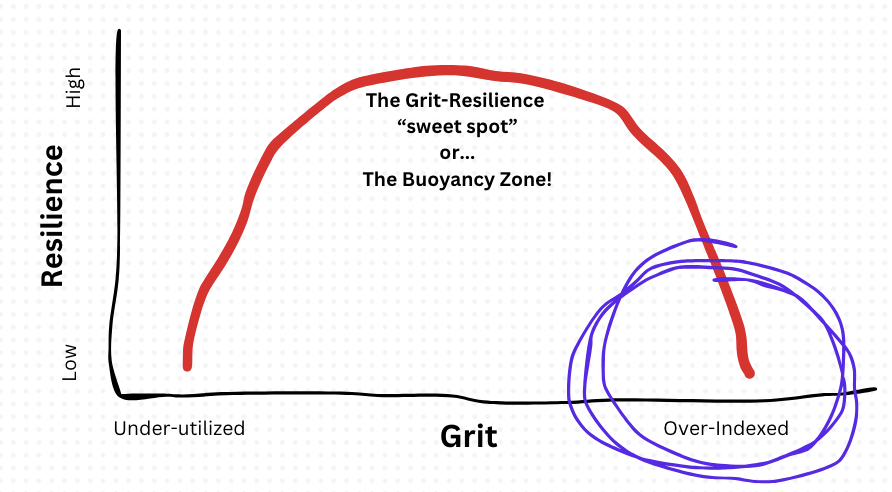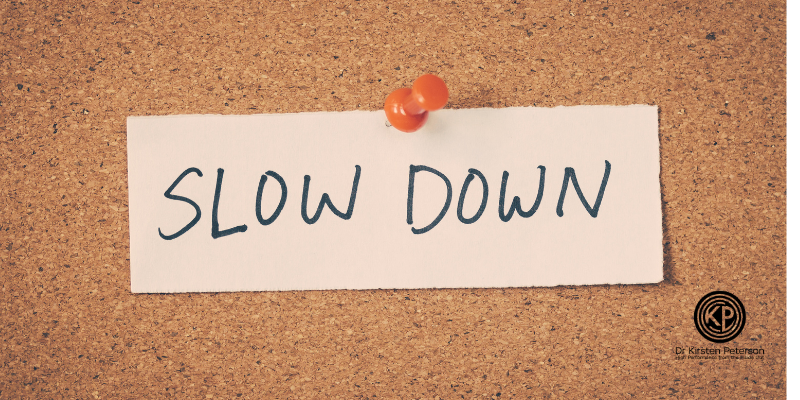
This is the last in a series about that less-than-obvious relationship between two presumed virtues: resilience and grit. Catch up on what you missed with these links (the relationship between them and what to do if you are low on both).
Now we are exploring the “Purple Zone.” This is when we grit too hard for too long, to the point where we actually erode our resilience and risk exhaustion, burn-out, or just the flat-out I’m done. F this sh%t.
How do we get to this point? When we think if a little grit is good, more is better.
The elite sport world is filled with “rags to riches” stories of the determined athlete who went the extra mile, trained at night, in the rain, against the odds (you’ve seen the movie “Rocky, yes?), and in doing so, won The Big Enchilada. At least, that’s what Hollywood would have us believe.
More than that, we are so often rewarded for our uber efforts by those who equate effort with outcome (a false equivalence, just saying). And in some contexts, effort and grit become the currency of performance. When everyone around me is being gritty, I’d better get on the bus just to look the part!
In reality, over-gritting is a thing—and not necessarily a good thing. I have noticed two ways in which people start to over-index on their grit.
The first pertains to a lack of flexibility in response to circumstance—when circumstances change and the individual fails to adapt. These were the sport coaches in 2020 who continued to train their athletes as if the Olympics were right around the corner when in fact, they’d just been delayed a year. In one case, this rigid behavior on the part of a national coach led to a quarter of his national team quitting in protest.
Reliance on grit in this situation can be counterproductive when it means blind adherence to what has always worked…but may not now.
The second way that grit can fail is in the form of a personal myopia. Having found and seemingly perfected their gritty processes, people in this context over-focus on their gritty efforts to their own detriment. This is the person who loses all sense of perspective in the pursuit of a long-held goal, who may suffer from the “sunk-cost fallacy,” the idea that once we have made an investment in something, we are loathe to give up on that investment even when it’s in our best interest to do so.
Whatever the cause, the end result of over-gritting, if left unchecked, is not pretty. Over-gritters risk persisting past the point of life balance, wellness, or reasonable perspective. No wonder resilience flees the scene!
Here are the mindset traps that trip up over-gritters…and what you can do.
Mindset Trap #1: I cannot, under any circumstances…quit. Quitting has become, in certain circles, akin to a moral failing—that is, if it isn’t already a sign of some larger societal failure. We struggle with quitters but love a good rags-to-riches perseverance saga.
How many stories have we heard about the successful, gritty person whose life story began when a (hopefully but not always) well-meaning parent or teacher told them they weren’t good enough to reach their dreams, thus inspiring the person to double down in an “I’ll show you!” kind of way and achieve success? Think of Walt Disney, who as a newspaper writer persisted despite being fired from his job at the Kansas City Star for not being creative enough.
What can non-quitters do? How can we reform? 🙂 First, gently realize the implausibility of that stance – life is never that simple. This is the time to zoom out and consider life in its fullness, rather than just focusing on The Goal. Or at least adding life to the Goal.
Then…dare yourself to consider how it would feel to put the weight of that goal…down. If in doing so, you feel…lighter, consider the previously impossible, and give yourself permission to quit. Knowing that sometimes, the smartest thing we can do? Is quit.
Mindset Trap #2: I didn’t realize I was over-gritting. Our ability to notice when something’s not quite right is radically enhanced when we take the time to build up our self-awareness. The awareness I speak of is our ability to listen to, to be with, and not fight or flee from the sense of discomfort or unease that emerges when we first become aware that things are not aligning. I find that many gritty people have actually learned to disregard their intuition or fear in the interest of just getting on with things.
How do I avoid the over-grit? The way in which people hone this awareness is through a regular purpose check-in. This can be as simple as asking yourself questions like these: Is this still what I want to be doing? Why? Does this give me energy or does it take it away? When I think of this pursuit, does it continue to make me happy? Does it still seem compelling? And then listen to the answers that come back.
Mindset Trap #3: Mistaking activity for achievement. Too often, we can burn ourselves out by exerting effort on the wrong stuff, things that seem important or useful but in the end don’t add value to the journey we are on.
Questions to ask if this is a risk: Are there gritty processes that seem rewarding but are not getting me closer to where I want to go? Do I find myself telling others how busy I am and lamenting the lack of time I have in my day?
If you are an over-critter, welcome to the club. I myself am a card-carrying member :). Having said that, I can both relate…and help. Get in touch if you want some help!


